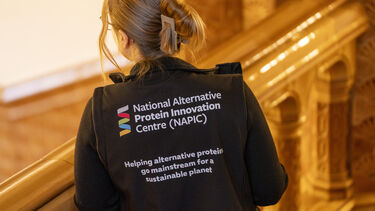On Friday 29 November, the National Alternative Protein Innovation Centre (NAPIC) celebrated its highly anticipated formal launch at the University of Leeds. Researchers from the Institute for Sustainable Food joined the celebration.
With over 250 registered delegates spanning academia, industry, investors, funders, and policymakers, the event signalled the beginning of an ambitious mission to transform the alternative protein landscape and contribute to a more sustainable future for our planet.
Professor Anne Ferguson-Smith, BBSRC Executive Chair, said, “This launch marks a significant milestone in the field of sustainable food innovation. Along with Innovate UK, BBSRC is proud to support this pioneering initiative that promises to drive innovation across the UK alternative proteins sector. By fostering collaboration among academics, industry leaders and policymakers, NAPIC stands at the forefront of addressing global challenges related to food security and a changing climate. This centre will help secure the UK's position as a leader in alternative protein research, exemplifying our commitment to driving scientific discoveries that cater to both environmental sustainability and public health needs."
About the National Alternative Protein Innovation Centre
NAPIC is a £38 million centre co-led by the University of Sheffield, University of Leeds, James Hutton Institute and Imperial College London, that will develop sustainable alternatives to animal proteins.
Alternative proteins (APs) such as cultured meat, plant proteins, insect-based proteins and proteins made by fermentation are derived from sources other than animals such as cereals, algae, insects and nuts, amongst others.
Over 30 researchers from the four institutions and more than 150 NAPIC partners will work closely to create a clear roadmap for the development of a National Protein Strategy for the UK.
The centre’s establishment has been made possible through funding from Biological Sciences Research Council (BBSRC) and Innovate UK, alongside vital support from stakeholders across the public and private sectors.
The launch event
Held at the Great Hall at the University of Leeds, the launch event featured an inspiring keynote address by Professor Tim Benton of Chatham House, who captivated the audience with his insights into the critical role of alternative proteins in creating a sustainable food system. He outlined the opportunities and challenges this emerging sector presents and underscored its relevance in combating climate change and ensuring global food security.
Luke Byrne, Innovation & Sustainability Director, THIS, said, "The launch of NAPIC is a ground breaking step forward for the plant-based food sector. It provides a unique opportunity to unite industry leaders, share expertise, and drive collective innovation. As a partner, we see this initiative as a catalyst for advancing the entire industry - accelerating progress, shaping standards, and fostering the growth needed to meet the demands from our planet for sustainable, plant-based solutions. NAPIC is a pioneering example of the movement towards transforming the future of food."
Adding to the momentum, Professor Anwesha Sarkar (University of Leeds, NAPIC Project Leader and Co-Director of the PERFORM Pillar) and Professor Karen Polizzi (Imperial College London, Co-Director of the PROCESS Pillar) provided an engaging overview of NAPIC’s vision, performance indicators and upcoming funding calls.
Professor Sarkar emphasized NAPIC's commitment to fostering a robust, sustainable platform of open innovation and responsible data exchange that mitigates risks while addressing the concerns of consumers and producers. Meanwhile, Professor Polizzi reiterated NAPIC’s mission: “To make alternative proteins mainstream for a sustainable planet.” She highlighted the centre’s goal of establishing the UK as a global leader in the alternative protein sector, driving progress toward health equity and the fight against climate change.
Rick Mumford, Deputy Chief Scientific Advisor & Deputy Director of Science & Research Science, Evidence and Research Division, Food Standards Agency (FSA), said, “As a food regulator, the alternative protein sector is of huge importance to the FSA. As we look to support innovation (and the potential benefits that will bring) and also protect consumers, we need access to high quality science and evidence. Through NAPIC, we have a unique and exciting opportunity to work with scientists and innovators to better understand some of the regulatory science challenges we face and work towards effective solutions.”
A panel discussion featuring representatives from key sectors, including the University of Sheffield, James Hutton Institute, Food Standards Agency, Good Food Institute, Plant Futures, and Innovate UK, further enriched the event. The panel explored the challenges and opportunities for open innovation in the alternative protein sector, offering valuable insights that will shape the upcoming funding calls.
Professor Tuck Seng Wong, from the University of Sheffield’s School of Chemical, Materials and Biological Engineering, said, “The launch event was a tremendous success, garnering enthusiastic support from a diverse range of partners, including academic institutions, industry leaders, regulators, investors, and start-ups. This resounding endorsement underscores NAPIC's pivotal role in bringing together the alternative protein community and marks a significant milestone for the UK in this nascent field.”
NAPIC has announced its readiness to welcome applications addressing challenges across all four core pillars—PRODUCE, PROCESS, PERFORM, and PEOPLE. These pillars encompass the entire value chain of alternative proteins, focusing on translating transformative technologies into effective, safe solutions that unlock the full potential of this sector.
Dr. Cristina Martínez Villaluenga, Department of Technological Processes and Biotechnology, Institute of Food Science and Technology and Nutrition, CSIC, Spain, said, “NAPIC offers a unique platform for global collaboration in alternative proteins, bringing together researchers, industry, and policymakers to build a sustainable protein ecosystem as a model worldwide. As an international partner, I value the shared expertise and vision driving impactful, scalable innovations.”
As NAPIC embarks on this exciting journey, it remains steadfast in its ambition to accelerate innovation and make alternative proteins an integral part of a sustainable and equitable global food system.





